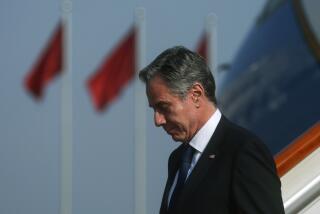Fearful Beijing Now Unlikely to Lift Martial Law
- Share via
BEIJING — The bloody uprising in Romania culminating in the execution of longtime leader Nicolae Ceausescu has alarmed China’s hard-line leaders and dimmed hopes for an early relaxation of martial law in Beijing.
American and other Western officials have repeatedly advised China that the removal of martial law would be a key step in restoring ties with the West. It would also help President Bush, who has been under fire from Congress for being too soft on China.
But diplomats said Thursday that Beijing could not afford to risk removing martial law, imposed more than six months ago, about two weeks before the army smashed its way into the capital to crush mass student-led protest demonstrations.
“The leadership is twitching with fear,” said a Western diplomat. “China’s leaders are extremely tense because of Romania. It is much more difficult for them to move (on martial law) now.”
Eastern European diplomats agreed.
“I don’t see how they can lift martial law now,” said an East European envoy. “They may have to keep it in place until the Asian Games.” Beijing hosts the games next September.
Bush has sent his national security adviser, Brent Scowcroft, to China on two missions to try to repair damage to ties from Beijing’s crackdown on students in June.
He has agreed to allow China to launch three U.S.-built satellites and removed a ban on trade credits by the U.S. Export-Import Bank.
“China is aware that Congress is profoundly unhappy with Bush over the Scowcroft missions and that something is expected in return,” a Western diplomat said.
China’s response has been minimal. It has agreed to allow the Voice of America broadcasting service to replace an expelled correspondent in Beijing, and to talk about an academic program.
Beijing’s public reaction to the upheaval in Romania has been cautious. It played down the unrest initially, giving its citizens only brief and vague reports, but later reported the execution of Ceausescu, the hard-line Communist president who resisted reforms sweeping Eastern Europe and was one of Beijing’s staunchest allies.
Beijing has since congratulated the new leaders and expressed its wishes for continued friendship.
Out of the public eye, it has taken a tough position, tightening security at campuses, giving Communist Party members the “correct” version of events and accusing Soviet President Mikhail S. Gorbachev of ultimately being to blame.
China insists that it is different from Romania, distant from Eastern Europe and with a brand of communism that sprang from its own revolution rather than being imposed by a foreign power.
But there are many similarities. Like Romania, China used massive force to crush unrest, resulting in heavy casualties. Beijing’s policies are highly unpopular and there is widespread personal dislike for certain members of the leadership.
More to Read
Sign up for Essential California
The most important California stories and recommendations in your inbox every morning.
You may occasionally receive promotional content from the Los Angeles Times.













